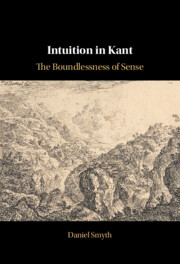Book contents
- Intuition in Kant
- Intuition in Kant
- Copyright page
- Epigraph
- Contents
- Acknowledgments
- Abbreviations, Citations, and Other Conventions
- Introduction
- 1 Reason’s Self-Knowledge and Kant’s Critical Methodology
- 2 Synthetic Judgment and Intuition
- 3 An Apperceptive Approach to the Transcendental Aesthetic
- 4 Exposition, Conceptual Analysis, and Apperception
- 5 Infinity, Discursivity, Givenness
- 6 Prolegomena to a Stufenleiter of Kantian Intuition
- 7 A Stufenleiter of Kantian Intuition, Part I
- 8 A Stufenleiter of Kantian Intuition, Part II
- Bibliography
- Index
8 - A Stufenleiter of Kantian Intuition, Part II
Receptivity and Sensibility
Published online by Cambridge University Press: 07 March 2024
- Intuition in Kant
- Intuition in Kant
- Copyright page
- Epigraph
- Contents
- Acknowledgments
- Abbreviations, Citations, and Other Conventions
- Introduction
- 1 Reason’s Self-Knowledge and Kant’s Critical Methodology
- 2 Synthetic Judgment and Intuition
- 3 An Apperceptive Approach to the Transcendental Aesthetic
- 4 Exposition, Conceptual Analysis, and Apperception
- 5 Infinity, Discursivity, Givenness
- 6 Prolegomena to a Stufenleiter of Kantian Intuition
- 7 A Stufenleiter of Kantian Intuition, Part I
- 8 A Stufenleiter of Kantian Intuition, Part II
- Bibliography
- Index
Summary
I continue explicating my Stufenleiter by distinguishing receptivity from sensibility, which are often conflated in the literature. I argue that the preestablished harmony theories of Leibniz and Crusius, as well as the “hyperphysical influx” Kant ascribes to Plato, involve receptive but non-sensible modes of intuition. I identify significant and underappreciated puzzles afflicting Kant’s notion of sensible affection: Kant has no account of how material objects can affect an immaterial mind, nor any account of how an immaterial mind can sensibly affect itself. I conclude by observing that many of the distinctions I discuss, such as the receptivity/sensibility distinction, track different levels of abstraction and that this can have significant consequences for motivating interpretations. Emphasizing sensibility often motivates phenomenological interpretations (Parsons), whereas semantic or “logical” readings (Hintikka) typically emphasize receptivity. I illustrate the fruitfulness of this diagnosis by distinguishing three different conceptions of the singularity of intuition, each associated with a different level of abstraction: receptive, sensible, and human.
Keywords
- Type
- Chapter
- Information
- Intuition in KantThe Boundlessness of Sense, pp. 217 - 242Publisher: Cambridge University PressPrint publication year: 2024

